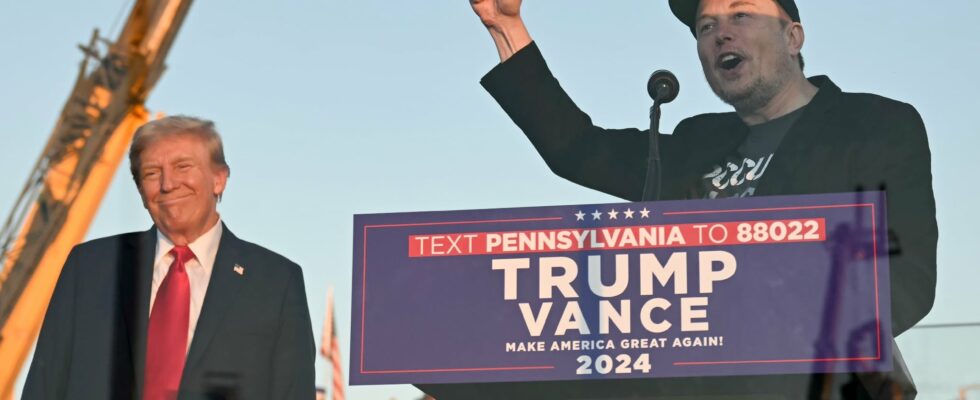Fist raised in the air, yellow cap flocked with the slogan “Make America Great Again” and determined look… Billionaire Elon Musk has everything of a Donald Trump supporter. Except that far from being an ordinary loyal supporter, he is also one of the Republican candidate’s biggest donors. Indeed, the boss of Tesla and SpaceX embarked on a whirlwind tour of Pennsylvania in order to rally voters to the cause of his septuagenarian foal. And nothing is too expensive if we want to make the United States falter.
On Saturday, October 19, Elon Musk presented a check for $1 million to a Harrisburg resident, promising to give such a gift to a different person every day until the election scheduled for November 5. The only criterion: having signed your petition from “America PAC”, the political action committee supporting Donald Trump’s campaign. The text concerns the defense of freedom of expression and the right to own a weapon, guaranteed by the American Constitution. The first winner is a man named John Dreher, who according to Musk was unaware of this award. “Anyway, you’re welcome,” said the ex-aeronautical engineer, handing him his check.
With this sports draw, Elon Musk hopes to boost voter registrations in Pennsylvania – a state that can be won by both Republicans and Democrats. “It seems like a good way to spend money,” said the boss of the social network X, which he uses as a megaphone for Trump’s ideas.
“Deeply concerning”
Elon Musk’s America PAC has already emerged as an important tool for mobilizing residents in key voting states. By waving checks with six zeros, the billionaire puts all the chances on his side. “This spectacular initiative from the founder of Tesla and SpaceX enters unknown territory in American politics”, comments The Wall Street Journal, taken up by International Mail. But are these practices legal? The Democratic governor of Pennsylvania on Sunday called on authorities to investigate the billionaire’s promise. Josh Shapiro said on “Meet the Press” NBC News that the South African business leader’s plan to give money to registered voters in Pennsylvania was “deeply concerning” and represented “something that law enforcement could look into.”
American laws are clear: it is illegal to pay anyone to register to vote. Justice Department guidelines say this includes “anything that has a monetary value, including cash, alcohol, lottery odds, and employee benefits such as food stamps.” However, some nudges helping people vote are legal and common: “Groups may offer rides to voters to the polls, for example, and companies often offer paid time off to give Americans time to vote, according to the directives”, lists the American daily The New York Times.
“A gray area”
According to the American media, Elon Musk’s methods “raise new legal questions.” THE Wall Street Journal goes further by finding that it is a federal offense punishable by prison time. One thing is certain: the initiatives of the richest man in the world increasingly flirt with legal red lines. And since he presented the petition at the beginning of October, the billionaire has opened his wallet crescendo: if he initially offered $47 to people sponsoring signatories, he then inflated his offer to $100, ensuring that it would pay the signatory and sponsor directly. But Elon Musk’s allies repeat it: the latter does not directly pay for voter registration, but rather rewards the signing of a petition which happens to be open only to registered voters.
Which does not prevent Brendan Fischer, a lawyer and defender of campaign financing, from expressing his concern in the columns of New York Times. “There would be little doubt about the legality if all Pennsylvania-based signers of the petition were eligible, but conditioning payments on registration arguably violates the law, which prohibits giving anything of value to induce or reward a person who registers on the electoral roll,” he explains.
Separately, one of the nation’s leading election law experts, Richard L. Hasen, also suggested that Musk’s practices appeared to exceed the law. “Even if some of the other things Musk was doing were murky legal, this one is clearly illegal,” Hasen, a law professor at the University of California, Los Angeles, wrote on his election law blog. But not everyone gives the same story. Brad Smith, former chairman of the Federal Election Commission, said it was “a gray area” but “not that close to the line.” Ditto for the American television channel NBC News, for whom the program does not seem to violate this law. The debate remains open.
